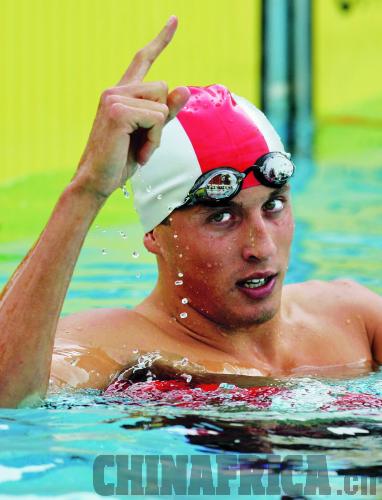|
|

|
|
GOLD HOPE:Kenyan swimmer Jason Dunford is an established forerunner |
Other medal options
But Africa is not only about track stars. Boxing has allowed many smaller African countries to be represented at the Olympics (like Algeria, Tanzania, Cameroon, Swaziland, Rwanda and Cape Verde). That will be complimented with a shout from Africa in badminton, taekwondo and judo. Athletes from South Sudan and Somalia will compete despite inferior training conditions and lack of funding.
Angola's basketball team is the best in Africa and the team hopes to pick up a medal. Angola is also sending two swimmers to the games. Benin will not finalize its roster until after the Senior Africa Athletics Championships, which ends in Porto Nova on July 14, the last day in Olympic qualification, but the country has entered two swimmers and a taekwondo contestant so far.
Ghana has five boxers and three track athletes, with long jumper Ignatius Gaisah expected to grab a medal in London. The boxers have been whipped into shape by Cuban coach, Roberto Ibanez Chavez, who managed to instill discipline into his charges. Kenya started the chase for gold in boxing at the Olympics in Seoul, South Korea in 1988 where Robert Wangila Napunyi was undisputed in the bantamweight category. The rest is history as Africans have always fought their way to the medal podium in this discipline.
Mali, despite its coup, has a women's basketball team going to the Olympics as well as a few swimmers and a track athlete.
Nigeria, famous for its sprinters, will again be drawing attention in London as the runners seek to defeat the Jamaicans and Americans. Veteran 100m runner, Olusoji Fasuba and Damola Osayemi carry the nation's hopes. Nigeria also looks dangerous and bound to clinch a medal in football. Since the generation of Nwankwo Kanu and Augustine "Jay Jay" Okocha, who lifted the gold medal in Atlanta in 1996, Nigeria has always had a firm grip on Olympic football.
This time around, the West African state will be sending two football teams (men and women), and have competitors in boxing, table tennis, judo, wrestling, weightlifting, taekwondo, badminton and swimming. Their chances of medals remain open though they must brave a formidable challenge from Europe and Asia.
Mauritius is renowned for its prowess in badminton and archery, while within the continent, Algeria's excellent volleyball team is rivaled only by that of Kenya. Egypt will be a dark horse in men's volleyball. However, these teams will be lucky if they get past preliminary rounds, as their resources and training are far behind those of their opponents in the Americas and Europe.
Senegal's hopes lie in 16 competitors in canoeing, judo, taekwondo and fencing. In track and field, the country has Aminata Diouf making her third Olympics appearance.
As usual, South Africa's large presence in the Olympics will be felt with a huge squad of more than 200 athletes in field hockey, shooting, swimming, track and field, rowing, canoeing, archery, cycling and fencing.
Fans will be sure to notice 400m double-amputee runner Oscar Pistorious. Nicknamed "blade runner," he runs on carbon fiber prosthetics called Cheetah Blades.
South Africa has over 20 swimmers, with stars like Ronald Schoeman, Suzaan Van Biljon (breaststroke) and Gerhard Zanberg (backstroke). Olympic fans should watch out for water-churning Kenyan swimming sensation Jason Dunford (freestyle), who broke the Olympic record for the 100m butterfly in Beijing at 51.14 seconds, though other swimmers beat his time afterward.
Zimbabwean Kirsty Coventry remains a medal hopeful. She won three medals in Athens and is the current world record holder in the 200m backstroke.
When Queen Elizabeth II opens the London Olympics on July 27, African athletes will pull out all the stops to follow the Olympic motto of "faster, higher and stronger." |